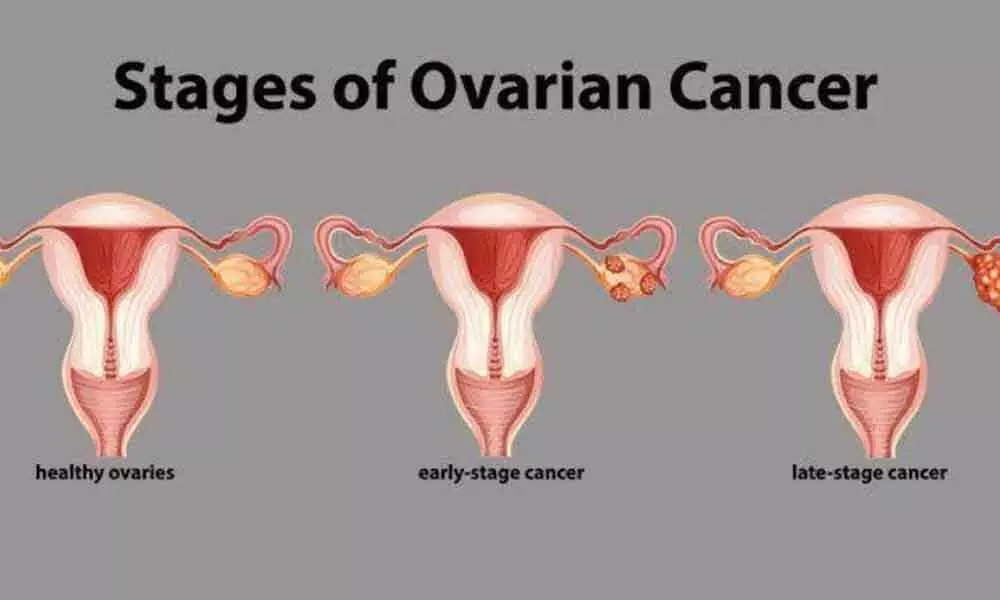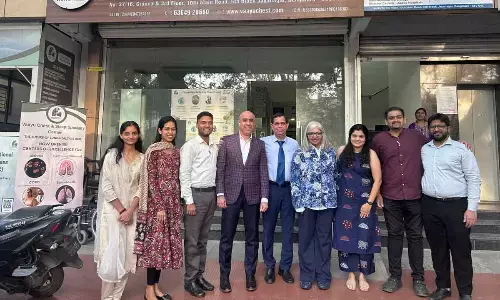Ovarian Cancer – Things to keep in mind

Ovarian Cancer
Ovarian Cancer, the second most commonly occurring gynaecological cancer in the country, is often presented with no symptoms in the early stages
Ovarian Cancer, the second most commonly occurring gynaecological cancer in the country, is often presented with no symptoms in the early stages. Therefore, it is hard to diagnose ovarian cancer. This cancer spreads faster leading to increased mortality among women. Although there are multiple types of ovarian cancer, the most common ones are those which develop on the ovarian surface lining which usually affects post-menopausal women.
Dr Baswant Rao Malipatil, Consultant - Medical Oncology, Columbia Asia Hospital Sarjapur Road Shares, "The cancerous growth that begins in the ovaries is considered as ovarian cancer and it can be in one or both of the ovaries. Some of the advanced-stage ovarian cancers might have symptoms like irregular periods, excessive vaginal bleeding during menstruation, loss of appetite, weight loss and pain in the abdominal area and pelvis. Urinary issues will also start to show up in the advanced stages of cancer."
As ovarian cancer is hard to detect in its early stages, the treatment becomes very difficult in the later stages. That is why the sooner the ovarian cancer is detected the better it can be treated.
There is no exact cause for ovarian cancers. Having a member in the family with ovarian cancer or breast cancer, post-menopausal status, hormonal replacement therapy, overweight, smoking are some of the major risk factors which put a woman at a greater risk of developing ovarian cancer. These are the factors which are beyond anyone's control. However, there are certain factors very much in our control which can help decrease the risk of ovarian cancer.
Beware of chemical-based cleansers: It is better to avoid using talcum powders, perfumed wipes, gels and vaginal deodorants as cleansers. Chemicals in these artificial products can increase the chances of causing cancer due to the carcinogenic properties. Remember, the vagina is designed to clean inside your body itself with natural vaginal secretions. With your normal bathing routine just ensure that you clean the space between the anus and vulva. Good perineal hygiene helps more than any artificial products.
Pregnancy and Breastfeeding: Many women consider getting married late and prefer to have children after they cross 30 years of age. A woman's fertility begins to decline after 30 years. Women who have given birth to a child before the age of 30 are known to have a lower risk of developing ovarian cancer. The more full-term pregnancies a woman has had, the lower the risk. Also, women who have breastfed their children considerably reduce the risk of ovarian cancer.
Healthy Lifestyle: Maintain a healthy lifestyle and have a balanced diet. Exercise regularly and keep your weight under control. Obese women are at a higher risk of developing ovarian cancer. Devote at least 30 minutes every day for a workout. Along with regular exercise, have a balanced diet loaded with fresh veggies, fruits and cut down excessive meat, salt intake and deep-fried food. Try to limit the usage of tobacco and alcohol as they too can help reduce the risk.
It is advised to undergo regular check-ups during post-menopausal stage. It can help in identifying any underlying complications. Also, following the above-mentioned practices will certainly reduce the risk of developing ovarian cancer to a great extent.








